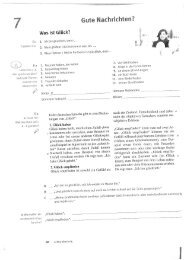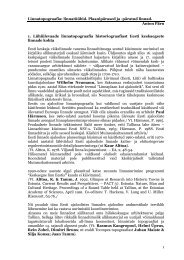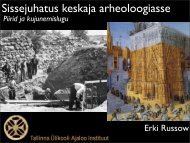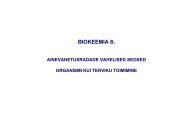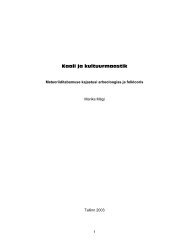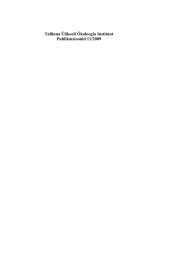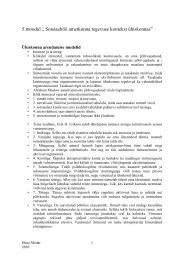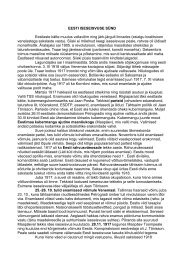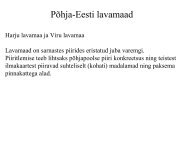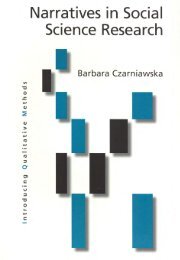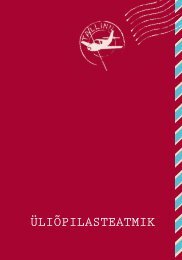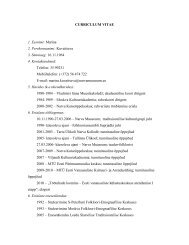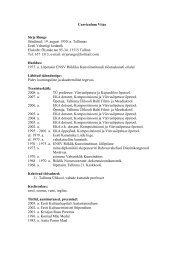CSW2506adc21eb555a90686949a0b328ef4fd.pdf
CSW2506adc21eb555a90686949a0b328ef4fd.pdf
CSW2506adc21eb555a90686949a0b328ef4fd.pdf
Create successful ePaper yourself
Turn your PDF publications into a flip-book with our unique Google optimized e-Paper software.
The 25th Communication Skills Workshop<br />
Managing Diversity: Theory and Practice<br />
24–26 May 2012<br />
Hotel Viru, Tallinn, Estonia
CONTENTS<br />
Welcome 3<br />
CSW Committee 3<br />
Sponsors 3<br />
Liability 3<br />
Conference Programme 4<br />
Parallel Sessions 5<br />
Plenary Speakers 7<br />
Themes 8<br />
Abstracts by Themes 9<br />
page<br />
Useful Phrases in Estonian 20<br />
Internet: http://communicationskillsworkshop.pbworks.com<br />
2<br />
Editor and photo: Leena Evesti
WELCOME<br />
Dear Workshop Participants<br />
It gives us great pleasure to welcome you all to Tallinn to the 25th Communication<br />
Skills Workshop. The Workshop is a meeting point for teachers of all languages,<br />
language revisers and administrators in Finnish and Estonian language centres and<br />
language departments alike. The event brings together a diverse group of delegates,<br />
to gain new insights and brainstorm ideas on the areas of language teaching<br />
and learning, and related topics. The working language of the workshop is English.<br />
We hope you will enjoy our time together in Tallinn!<br />
CSW COMMITTEE MEMBERS 2010-12<br />
Ene Alas (Chair) Tallinn University<br />
Eva Braidwood University of Oulu<br />
Leena Evesti (Treasurer) University of Helsinki<br />
Colette Gattoni Åbo Akademi<br />
Tuija Junkkari Kymenlaakso University of Applied Sciences<br />
Heather Kannasmaa University of Oulu<br />
Suliko Liiv Tallinn University<br />
Jen MacArthur (Website) University of Vaasa<br />
Eha Mängel (Secretary) Tallinn University<br />
Karen Niskanen University of Oulu<br />
Kari Pitkänen University of Helsinki<br />
Kärt Rummel Estonian Information Technology College<br />
Taija Swanström Aalto University<br />
SPONSORS<br />
Allecto AS<br />
Tallinn University Institute of Germanic and Romance Languages and Cultures<br />
US Embassy in Tallinn<br />
Liability<br />
By registering for the conference, participants agree that neither CSW nor the<br />
CSW Committee assumes any responsibility for damage or injury to persons or<br />
property during the conference. Participants are advised to organize their own<br />
health, travel and personal insurance.<br />
3
Conference Programme<br />
Thursday, May 24, 2012<br />
14.00–15.00 Registration & coffee Conference Centre Lobby, 2nd floor<br />
15.00–16.30 Plenary I Developing academic literacy skills.<br />
Clare Furneaux Grande I+II.<br />
17.30 Optional tour of the Tallinn Old Town<br />
Friday, May 25, 2012<br />
9.00–10.30 Plenary II Catering for a wide variety of student needs in an<br />
EAP context.<br />
Clare Furneaux Grande I+II<br />
10.30–11.00 Coffee break Conference Centre Lobby, 2nd floor<br />
11.00–13.00 Parallel Sessions. See timetable on pages 5–6.<br />
Bolero I, Bolero II, Allegro<br />
13.00–14.00 Lunch 2nd floor buffet restaurant<br />
14.00–16.00 Parallel Sessions. See timetable on pages 5–6.<br />
Bolero I, Bolero II, Allegro<br />
19.30 Conference Dinner Merineitsi Restaurant, 2nd floor<br />
Saturday, May 26, 2012<br />
9.30–10.30 Plenary III English-medium programmes and the use of<br />
English as an academic lingua franca.<br />
Niina Hynninen Grande I+II<br />
10.30–11.00 Coffee break Conference Centre Lobby, 2nd floor<br />
11.00–12.00 Conclusion: final comments, election of the new<br />
committee, book raffle Grande I+II<br />
12.00–13.00 Lunch 2nd floor buffet restaurant<br />
Allecto book sale: Friday 9.00–16.30 and Saturday 9.00–12.30<br />
4
Timetable for parallel sessions, Friday 11:00–13:00<br />
Time Bolero 1 Bolero 2 Allegro<br />
1.1 New Way of Working: 6.1 A CLIL experiment 8.1 Oral Proficiency<br />
Responding to Student<br />
Interviewers as Agents of<br />
11. 00 – and Teacher Needs at the<br />
Diversity<br />
11. 30 LUT LC<br />
11.30 –<br />
12.00<br />
12. 00 –<br />
12. 30<br />
12. 30 –<br />
13.00<br />
13. 00 –<br />
14.00<br />
Paula Haapanen<br />
1.2 Helping Learners who<br />
Struggle with University<br />
Foreign Language Requirements<br />
Heather Kannasmaa<br />
1.3 Practical Examples of<br />
Use of Multimedia in Elearning<br />
Alain Thibault<br />
1.4 Out of the Corner of<br />
the Eye: Creative<br />
Writing as an Advanced<br />
EAPS Course<br />
Paul Graves<br />
Jane Honka<br />
6.2 Promoting Content<br />
and Language Integrated<br />
learning Among Estonian<br />
Teachers of English<br />
Liljana Scopinskaja & Suliko<br />
Liiv<br />
6.3 UniTIE: The Hidden<br />
Pearl<br />
Paula Haapanen & Karen<br />
Niskanen<br />
6.4 Video Conferencing:<br />
Creating International<br />
Connections<br />
Kirby Vincent & Sandro<br />
Amendolara<br />
Ene Alas<br />
8.2 Reflections and<br />
Research into University-<br />
Level Exemption Testing in<br />
Finland<br />
Jonathon Martin & Fergal<br />
Bradley & Sandro Amendolara<br />
2.1 Teaching Emotional<br />
Intelligence in an English<br />
Communication Course<br />
Pia Lappalainen<br />
2.2 Application of a Communicative<br />
Competence<br />
Model for Written<br />
Discourse to Enhance the<br />
Learning of Students<br />
Writing in their Discipline<br />
Suzy McAnsh & Eva Braidwood<br />
Lunch Lunch Lunch<br />
5
Timetable for parallel sessions, Friday 14:00–16:00<br />
14. 00 –<br />
14. 30<br />
14. 30 –<br />
15.00<br />
15. 00 –<br />
15.30<br />
15. 30 –<br />
16.00<br />
5.1 Resistances and<br />
Pragmatics: Norwegian<br />
Academics and the HiOA<br />
Writing Course<br />
Ann Torday Gulden<br />
4.1 Strategies to Support<br />
Multicultural Students in<br />
Content Classes<br />
Henno Erikson Parks<br />
4.2 Cultural Identity and<br />
Second Language<br />
Acquisition: A Narrative<br />
Analysis Approach<br />
Karen Niskanen<br />
4.3 Literature in English as<br />
a Means of Raising Cultural<br />
Awareness and Teaching<br />
Diversity at the University<br />
Level (English Philology<br />
and Teacher Education)<br />
Julia Tofantšuk & Paul<br />
Rüsse<br />
6.5 A Thematic Approach<br />
to Academic Courses<br />
Kirby Vincent<br />
6.6 The need for more<br />
support: surveying<br />
academic writing and<br />
communication at the<br />
University of Tartu<br />
Djuddah Leijen & Ele Sepp<br />
6.7 Diversities in<br />
Teaching the Latin<br />
Language and Culture to<br />
students of Philology<br />
Merike Ristikivi & Maris<br />
Valtin<br />
1.5 The exchange experience<br />
at Åbo Akademi,<br />
Finland since Bologna:<br />
Perspectives on pedagogical<br />
issues and learner<br />
realities<br />
Colette Gattoni<br />
6<br />
3.1 Strategies for<br />
Successful Organisation of<br />
Independent Work<br />
Irina Petrova<br />
3.2 Student profiles in<br />
ALMS<br />
Satu von Boehm<br />
7.1 Revision vs. Teaching:<br />
Are they Compatible?<br />
Julie Uusinarkaus<br />
7.2 The merits of<br />
discourse-oriented EAP<br />
writing instruction in enhancing<br />
the communicative<br />
quality of non-native<br />
writers’ texts<br />
Kärt Rummel
Plenary speakers<br />
Clare Furneaux<br />
Clare Furneaux is a British National Teaching Fellow and a Senior Lecturer in Applied Linguistics<br />
at the University of Reading, UK, where she teaches on MAs in English Language<br />
Teaching (campus-based and distance study) and an undergraduate programme in English<br />
Language for home students. She directs the MA ELT by Distance Study. She teaches<br />
modules on literacy and English language teaching, especially language curriculum design<br />
and written language. Clare’s research interests are concerned with developing second<br />
language writing skills (especially in English for Academic Purposes contexts) and on-line/<br />
distance learning. She also supervises research in the areas of curriculum design. She attended<br />
CSW in 2006 and is delighted to have the opportunity to participate once more.<br />
Plenary 1 Developing academic literacy skills<br />
In this plenary I will discuss the development of academic writing in post-graduate students<br />
in an international context, where students come from a professional background<br />
and they have been out of study for some time. I shall talk about a study I conducted with<br />
a group of such students as they make the transition into Masters level study. The study explores<br />
how they learned what the academic writing requirements were for the first term,<br />
focusing on how they responded to advice from tutors, their reactions to the feedback<br />
provided and how they used it. Themes that emerged from the exploration of the development<br />
of academic writing in this context include: the influence of background (academic,<br />
professional, discipline, linguistic); personal characteristics (such as expectations and motivations)<br />
and the role of literacy brokers. I will argue that the issues raised apply to students<br />
in all academic contexts, not just the post-graduate one.<br />
Plenary 2 Catering for a wide variety of student needs in an EAP context<br />
English-medium universities now cater for students from a wide range of international<br />
backgrounds and studying in different discipline areas. How can pre-sessional courses help<br />
prepare students to go on to study their own subject in English? Drawing insights from<br />
teachers and students, I will ask you to engage with some of the central issues here, identifying<br />
challenges and offering some solutions.<br />
7
Niina Hynninen<br />
Since the autumn of 2007, Niina Hynninen has been working on her PhD thesis on language<br />
regulation in English as a lingua franca (ELF). Over the course of her studies, Niina<br />
has been involved in different ELF-related projects and research communities. Currently<br />
she participates in the Global English (GlobE) project (www.uef.fi/globe) and the Lingua<br />
Francas and Plurilingualism research community, and is a member of the ELF research<br />
team (www.helsinki.fi/elfa). Her research interests include English as a lingua franca, normativity<br />
in language, discourse analysis, and spoken interaction.<br />
Plenary 3 English-medium programmes and the use of English as an academic lingua<br />
franca<br />
In universities and other higher-education institutions outside English-speaking countries,<br />
more and more study programmes are run in English. On the one hand, this trend reflects<br />
the global use of English as a lingua franca – a shared language used for communication<br />
between speakers of different first languages. The use of English is defended as a prerequisite<br />
for the internationalisation of higher education institutions. On the other hand,<br />
the use of English also reinforces the status of English as the language of science and academia,<br />
and it is seen to weaken the position of national languages as the languages of<br />
science and higher education. But what does it mean for the students and teachers in the<br />
study programmes to use English as an academic lingua franca? And what implications<br />
does the use of English in international contexts have on the English language itself? In this<br />
presentation, I address these two questions by drawing on my research on English as an<br />
academic lingua franca.<br />
Parallel sessions: themes<br />
1. catering for a variety of student and teacher needs in terms of teaching styles /<br />
learning styles<br />
2. skills development<br />
3. learner autonomy<br />
4. handling cultural differences<br />
5. English as a Lingua Franca in academic settings<br />
6. needs analysis; developing curricula; course content; feedback<br />
7. thesis supervision; editing/revising academic texts<br />
8. testing language skills.<br />
8
1. CATERINg FOR A vARIETy OF STuDENT AND TEAChER NEEDS IN<br />
TERMS OF TEAChINg STyLES / LEARNINg STyLES<br />
1.1<br />
Title of paper: A new way of working: responding to student and teacher<br />
needs at the LuT Language Centre<br />
Presenter: Paula Haapanen, Lecturer, Paula.Haapanen@lut.fi<br />
Affiliation: Lappeenranta University of Technology Language Centre<br />
Key words: team teaching, collaborative learning, modules, case studies,<br />
social media, learning to learn, curriculum planning<br />
Today’s students are different to those of 20 years ago; they are mobile, master technology<br />
and seek information on a ‘on needs’ basis. This translates into asynchronous, fragmented<br />
and ‘easy access’ learning style that the traditional twice-weekly contact lesson is hard<br />
pressed to satisfy. Today’s language teachers are different as well; they deal with skyrocketing<br />
classroom enrollment and subsequently, increased workloads which may affect<br />
quality and how teachers cope. We at the Lappeenranta University of Technology (LUT)<br />
Language Centre have tried to respond to both constituents’ needs by reorganizing the<br />
learning experience. This has resulted in the ongoing development of an asynchronous,<br />
modular communication skills course in English that incorporates new tools and authentic<br />
project work in the learning experience in order to stimulate students and teachers to<br />
work differently.<br />
1.2<br />
Title of paper: helping learners who struggle with university foreign language<br />
requirements<br />
Presenter: Heather Kannasmaa, Lecturer, Heather.Kannasmaa@oulu.fi<br />
Affiliation: University of Oulu, Extension School, Languages and<br />
Communication<br />
Key words: learning difficulties, dyslexia, affect, language learning, remedial<br />
course, learning to learn, learner identity<br />
This presentation begins by describing my recent work to better understand the obstacles<br />
to language learning faced by a small but significant minority of university students; source<br />
data is provided by 17 volunteers interviewed in autumn 2009 about their struggles with<br />
English. Their commentaries yield a set of “common ground” factors, both cognitive and<br />
psychological, that would seem to warrant special attention when we work with dyslexics<br />
and other special learners. I will then briefly describe the August 2011 implementation of<br />
a remedial English course targeted primarily at freshmen entering Oulu University, where<br />
I have attempted to address several issues common to special learners. Finally, I present<br />
some sample comments from written course feedback and from a closing discussion to<br />
help clarify shifts towards students’ having more positive self-views as learners, and as<br />
evidence of increased metacognitive awareness with regard to language learning.<br />
9
1.3<br />
Title of paper: Practical examples of use of multimedia in E-learning<br />
Presenter: Alain Thibault, lehtori, Tievie kouluttaja, alain.thibault@aalto.fi<br />
Affiliation: Aalto University<br />
Key words: E-learning , use of flash technology, Dreamweaver, multimedia<br />
material, self-learning material, Internet pedagogy<br />
In the presentation I was considering to introduce as an example:<br />
1/ A French course mainly based on a mainly multimedia material (included videos) that<br />
advanced students are using to learn how to sell and buy their technology, in the case they<br />
are building a company for that purpose. I will try to show the pedagogy behind it, from a<br />
teacher point of view, in order to increase their motivation, their skills, and some tricks to<br />
make sure that they really do what they are expected.<br />
2/ For years I also worked on national Radio/TV to develop material for teaching through<br />
the medias, therefore I would like to show some concrete examples, already on the internet,<br />
how they were planned, how they were developed, which systems were used (Flash,<br />
premiere pro, Dreamweaver, etc.).<br />
I could show some documents developed in order to teach some special grammatical skills, and<br />
other ones aiming to introduce a socio-cultural situation that would be used by the student to<br />
work at home, in order to analyze the document and then produce an oral or written presentation.<br />
I would also produce some test results showing that the French (and German courses)<br />
using this possibilities had much better results than previously, without that kind of support.<br />
1.4<br />
Title of paper: Out of the Corner of the Eye: Creative Writing as an Advanced EAPS<br />
Course<br />
Presenter: Paul Graves, University Lecturer, paul.graves@helsinki.fi<br />
Affiliation: University of Helsinki Language Centre<br />
Key words: creative writing, stories, poems, peer critiquing, critical discussion<br />
I mean to discuss the usefulness of offering a creative writing workshop among other<br />
advanced EAPS courses. Instead of explicitly imitating or shadowing students’ academic<br />
tasks, the course invites students to the pleasure and freedom of assuming complete authority<br />
over their own stories and poems. At the same time, it forces students to subject<br />
every submitted text to an open peer-critique discussion. This procedure can be useful in<br />
advancing two aims: (1) widening the range of English the students have as a resource,<br />
since mastery of narrative and an ear for the language are immeasurable aids in linguistic<br />
flexibility, precision and fluency; and (2) enhancing students’ academically relevant skills<br />
and confidence in writing and critical discussion while the students are focused on narrative<br />
and the sounds of words.<br />
10
1.5<br />
Title of paper: The exchange experience at Åbo Akademi, Finland since Bologna:<br />
Perspectives on pedagogical issues and learner realities<br />
Presenter: Colette Gattoni, Lecturer in English Language, colette.gattoni@abo.fi<br />
Affiliation: Åbo Akademi University, Centre for Language and Communication<br />
Key words: Bologna reforms, Erasmus exchange, Finland, attitudes, language<br />
proficiency, internationalisation<br />
Åbo Akademi (ÅAU) in Turku is unique as the only university catering for the Swedishspeaking<br />
minority in Finland. The official language of instruction is Swedish but English is<br />
used increasingly, as a result of the setting up of international master’s programmes. The<br />
Centre for Language and Communication (CSK) at ÅAU receives growing numbers of exchange<br />
students who come through Erasmus and other international programmes.<br />
The aim of this paper is to present the findings of a small-scale study consisting of attitude<br />
surveys and interviews of the exchange experience from the perspective of various stakeholders,<br />
including that of the incoming students themselves, the local student population,<br />
the receiving administration, the subject teaching staff of various departments and<br />
language teaching staff at the CSK. To date, this seems to be a relatively under-researched<br />
area in Finland and it is hoped that this snapshot of the current situation in ÅAU and the<br />
CSK will initiate debate and shed light on both pedagogical issues and learner realities in<br />
the wake of the Bologna reforms initiated in 2005.<br />
2. SKILLS DEvELOPMENT<br />
2.1<br />
Title of paper: Teaching emotional intelligence skills in an English communication<br />
course<br />
Presenter: Pia Lappalainen, Lecturer, pia.lappalainen@aalto.fi<br />
Affiliation: Aalto University Language Centre<br />
Key words: emotional intelligence, social competence, engineering education,<br />
language studies<br />
As working conditions, methods and tools in industries as well as the related competences<br />
have changed drastically as a result of accelerated technological advancement and globalization,<br />
work communities have started to look for ways to respond to these new requirements.<br />
Industries are increasingly acknowledging the potential of social competence,<br />
materializing in the way modern employees lead themselves and their teams and interact<br />
and communicate with those around.<br />
As employees’ social competence impacts organizational performance through the application<br />
of so-called intrapersonal and interpersonal skills, universities are facing pressure to<br />
revise their curricula by integrating soft skills more systematically into their core offerings.<br />
11
As one solution, this paper proposes the incorporation of emotional intelligence and social<br />
competence themes and training in graduate syllabi. It also reports experiences from a<br />
course experimenting with new methodology in communications education directed to<br />
engineering students. The proposed pedagogy addresses classroom management strategies<br />
drawing from problem-based learning, student empowerment, and collaborative<br />
learning, and so-called socially competent teachership founded on teacher immediacy and<br />
perceived caring, all constituting strategies moving away from student compliance and<br />
teacher modelling.<br />
2.2<br />
Title of paper: Application of a Communicative Competence Model for Written<br />
Discourse to Enhance the Learning of Students Writing in their<br />
Disciplines<br />
Presenters: Suzy McAnsh, M.A. , suzy.mcansh@oulu.fi<br />
Eva Braidwood, Ph.D., eva.braidwood@oulu.fi<br />
Affiliation: University of Oulu, Extension School<br />
Key words: communicative competence, written discourse, writing in the<br />
disciplines, scientific writing, self-assessment, feedback<br />
This presentation introduces a model of communicative competence for written discourse<br />
consisting of six components of competence, at work simultaneously or in turn during<br />
the writing process. The six components represented in the model indicate the various<br />
types of knowledge and skills needed by a writer to create a successful contribution to<br />
the discourse of their discipline. Awareness of the various components, we believe, empowers<br />
novice writers who face the challenge of producing scientific articles that meet<br />
the requirements of the gatekeepers. In this presentation we describe how we apply the<br />
model in scientific writing courses both in the instructional and the feedback phase. In addition,<br />
we discuss the students’ reaction and their development as writers as evidenced<br />
from their self-assessment. Through the classroom use of this model, we hope to encourage<br />
students to recognise the complexity of considerations to be taken into account when<br />
writing and to identify for themselves the features of written communication requiring<br />
deliberation during writing tasks even beyond the course.<br />
12
3. LEARNER AuTONOMy<br />
3.1<br />
Title of paper: Strategies for Successful Organization of Independent Work<br />
Presenter: Irina Petrova, M.A., nc0444@gmail.com<br />
Affiliation: Virumaa College of Tallinn University of Technology<br />
Key words: autonomous learning, e-learning, motivation, engagement, learner<br />
support<br />
Autonomous learning, distant courses, independent study skills, life-long education, and<br />
other related concepts have been buzzwords for quite a while. Unsurprisingly, the amount<br />
of homework at schools and universities has been increasing to such an extent that now<br />
there are subjects that are acquired partially or completely outside the classroom without<br />
the physical presence of the teacher. Studies show that courses conducted via the Internet<br />
can be as efficient as traditional learning. However, in case of students with initially low<br />
levels of motivation for self-study or lack of self-discipline, additional effort and trick are<br />
required on the teacher’s part to “help” the students practice in a language regularly. For<br />
example, a student who took part in an English course where the elements of traditional<br />
and electronic education were combined expressed the following concern (the original<br />
language is kept): “For me this way (working in WebCT) is not good. I thing this way of<br />
education for the students which is on the first course, is unsuitable. In a first course I cant<br />
work individually without control because if no one is forcing me to teach, I leave everything<br />
on the last day.” The aim of the talk is, thus, to discuss possible ways of maintaining<br />
learners’ engagement throughout the course.<br />
3.2<br />
Title of paper: Student profiles in ALMS<br />
Presenter: Satu von Boehm, M.A., satu.vonboehm@helsinki.fi<br />
Affiliation: University of Helsinki Language Centre<br />
Key words: learner autonomy, learner history, reflection, learner awareness,<br />
counselling, advising<br />
ALMS (Autonomous Learning Modules) is an optional way to study English at the Language<br />
Centre of the University of Helsinki. ALMS offers an autonomous way of study, one where<br />
the students play the central role: they set their own goals, carry out their projects and<br />
evaluate their own learning. ALMS students are provided with guidance from teachers in<br />
the form of two group sessions on learner-awareness and with three one-to-one counselling<br />
sessions.<br />
One of the core elements in ALMS is reflection. Students are asked to consider how their past,<br />
present and future interact, what their needs in English are and how they learn best. For this<br />
purpose, they are asked to write a profile of themselves as language learners. The students may<br />
either opt to write a free-form reflection text or to use a learning-to-learn website, Kaleidoscope.<br />
13
This presentation discusses the role of the profile in ALMS counselling and how the tools<br />
provided for it function. In 2009, students using Kaleidoscope were studied, and in 2011-<br />
2012, a similar study is being conducted on the students choosing the reflection text. Results<br />
from the two studies will be presented.<br />
4. hANDLINg CuLTuRAL DIFFERENCES<br />
4.1<br />
Title of paper: Strategies to Support Multicultural Students in Content Classes<br />
Presenter: Henno Erikson Parks, Lecturer in English and Communication Skills,<br />
henno.parks@utu.fi<br />
Affiliation: University of Turku<br />
Key words: Multicultural, Cultural Community, Learning Patterns, Negotiating<br />
Ideas, Classroom Strategies<br />
Each time we teach a course, it is essentially a new ballgame. The content changes over<br />
time, our students change, and we change. The complex dynamics involved in the processes<br />
of teaching and learning take on new layers of meaning when we stop to consider<br />
the ways in which we are similar as well as different from one another.<br />
Therefore, every classroom is a cultural community reflective of the disciplines and perspectives<br />
studied, the authors, the students, and the professor. A student can also learn<br />
that there are various patterns of values, speech, preferences, and behaviors associated<br />
with different cultures, and they can learn that there are as many differences within cultural<br />
groups as there are across different cultures. This helps the students break down<br />
cultural stereotypes in society as a whole.<br />
Using these methods, students learn that they each may have a unique learning pattern<br />
and this realization of their own “multiple subjectivities” can help them understand the<br />
multiple and interlocking identities in the people and groups around them. The classroom<br />
then becomes a living laboratory for negotiating individual and group differences, as well<br />
as for negotiating ideas about the content and concepts of the class. Not all negotiations<br />
are easy, but the work to listen and to learn across both similarities and differences can<br />
only produce better and more effective learning for all students in a multicultural world.<br />
4.2<br />
Title of paper: Cultural identity and second language acquisition: a narrative analysis<br />
approach<br />
Presenter: Karen Niskanen, M.A., Karen.Niskanen@oulu.fi<br />
Affiliation: University of Oulu Extension School (Languages and Communication)<br />
14
Key words: cultural identity, interviews, narrative analysis, international students,<br />
transnational identity<br />
As a method for the study of identity, narrative analysis is used in a broad range of social<br />
science fields, e.g. psychology, history, anthropology, medicine, etc. In the first phase of<br />
this study, statistical correlations of variables in SLA indicate that linguistic and cultural<br />
identities, and especially transnational identities, play a significant role in the language acquisition<br />
process. This paper describes the follow-up study, in which thematic and structural<br />
narrative methods are used to examine how identity is represented in semi-structured<br />
interviews with 10 international baccalaureate students.<br />
4.3<br />
Title of paper: Literature in English as a Means of Raising Cultural Awareness and<br />
Teaching Diversity at the university Level (English Philology and<br />
Teacher Education)<br />
Presenters: Julia Tofantšuk, PhD, Associate Professor<br />
Paul Rüsse, MA, Lecturer, paul@tlu.ee<br />
Affiliation: Tallinn University, Estonia<br />
Key words: teaching literature at university level; intercultural awareness;<br />
postcolonial literatures in English<br />
Literature is an indispensable part of foreign language learning and thus occupies a strong<br />
place in the university curriculum of English philology. It is also important in teacher education<br />
for a variety of reasons, both traditional (medium of teaching grammar, vocabulary,<br />
communicating ideas, raising general erudition) and relevant in the present-day world,<br />
namely as a means of promoting cultural awareness and reflecting the complexity and<br />
diversity of present-day, particularly English-speaking, culture.<br />
Various scholars (Bakhtin, Ricoeur, Narančić-Kovać, Kaltenbacher, Fenner) have pointed<br />
out ‘the dialogic nature of literary texts’ and the consequent role of literature as dialogue<br />
between the learner’s and target culture. In our paper, we shall focus on the specific nature<br />
of contemporary literature in English as avenue for more global communication – between<br />
the learner and the inner differences, impurity (in Stuart Hall’s terms) and hybridity<br />
of no-longer-homogenous British and American cultures. We shall draw upon examples we<br />
use in our own teaching practice at Tallinn University – texts from Native American, Black<br />
American, Black British, and Asian British literatures.<br />
15
5. ENgLISh AS A LINguA FRANCA IN ACADEMIC SETTINgS<br />
5.1<br />
Title of paper: Resistances and Pragmatics: Norwegian Academics and the HiOA<br />
Writing Course<br />
Presenter: Ann Torday Gulden, Associate professor, AnnTorday.Gulden@hioa.no<br />
Affiliation: Centre for Pedagogical Research and Development, Oslo and Akershus<br />
University College of Applied Sciences (HiOA), Norway<br />
Key words: ESP, resistance, academic staff, L2 researcher identity<br />
ELF in Norwegian academia is often met with ambivalence. There appears to be more<br />
resistance in the ‘soft’ than in the ‘hard’ sciences. The writing course for academic staff<br />
in Oslo is participant-centred, and the main objective being to deliver a toolkit differentiated<br />
enough for use in the diverse disciplines represented. Participants work with their<br />
manuscripts throughout the course, cumulatively integrating course material into their<br />
texts as the various ‘tools’ are introduced. This paper will address some factors contributing<br />
to national resistances to ELF, and show means by which the academic writing course<br />
manoeuvres amongst resistances through acknowledgment and aims to enable a happier<br />
development of academic identity in ‘somebody else’s language’. The complex role of the<br />
ESP course-holder as colleague, facilitator, manager of diversity and ‘expert’ will be discussed.<br />
The presentation draws on social constructivist perspectives with regard to elements<br />
of reciprocal learning in the group, using participants’ needs analyses and reflection<br />
statements which are an integral part of the academic writing course in Oslo.<br />
6. NEEDS ANALySIS; DEvELOPINg CuRRICuLA; COuRSE CONTENT;<br />
FEEDBACK<br />
6.1<br />
Title of paper: A CLIL experiment<br />
Presenter: Jane Honka, Lecturer, jahonka@utu.fi<br />
Affiliation: University of Turku, Language Centre<br />
Key words: CLIL, master’s thesis, academic writing, language support<br />
Content and Language Integrated Learning (CLIL) has a dual aim: learning the subject matter<br />
(content) for a course of study, and learning the second/foreign language used as the medium<br />
of instruction for the content. This presentation describes an adjunct CLIL English language<br />
support course (for thesis writing) developed for students on the two-year Faculty of Education<br />
(English) Master’s degree programme in Learning, Learning Environments and Educational<br />
Systems (LLEES). The course consists of a mixture of group sessions on aspects of academic<br />
writing, based on the results of a Webropol student and staff questionnaire; guided<br />
self-study; and consultations with a tutor and with the teacher. Perspectives from the three<br />
participating parties (LLEES staff, LLEES students and English lecturer) will be presented. The<br />
course started in spring 2011 and is continuing, but this is still very much work in progress.<br />
16
6.2<br />
Title of paper: Promoting Content and Language Integrated Learning Among<br />
Estonian Teachers of English<br />
Presenters: Liljana Skopinskaja, Associate Professor, liljana@tlu.ee<br />
Suliko Liiv, Professor, liiv@tlu.ee<br />
Affiliation: Tallinn University, Institute of Germanic and Romance Languages and<br />
Cultures<br />
Key words: content and language integrated learning, CLIL teacher profile,<br />
questionnaire study, English instruction, Estonian context<br />
The report discusses the application of English-based content and language integrated<br />
learning (CLIL) in Estonian classroom context focusing on a questionnaire study carried<br />
out among Estonian CLIL teachers that allows the authors to establish some fundamental<br />
aspects of an Estonian CLIL teacher profile. The questionnaire consists of three sections<br />
of questions. The aim of the first set is to gather some general information about Estonian<br />
CLIL teachers, such as their length of service and CLIL experience; the second set<br />
investigates implementation procedures of the CLIL methodology and strategies employed<br />
by teachers, and the last set of questions examines teachers’ self-evaluation of their CLIL<br />
competences.<br />
The findings regarding CLIL teachers’ perception of their command of the CLIL methodology<br />
are seen as a necessary step towards a more systematic expansion of CLIL programming<br />
and implementation at different levels (secondary and tertiary) of the English instruction<br />
in Estonia and building more teacher awareness of the processes taking place in the CLIL<br />
classroom.<br />
This research has been supported by grant no. 9037 of the Estonian Science Foundation.<br />
6.3<br />
Title of paper: uniTIE: the hidden Pearl<br />
Presenters: Paula Haapanen, Lecturer, paula.haapanen@lut.fi<br />
Karen Niskanen, Lecturer, karen.niskanen@oulu.fi<br />
Affiliation: Lappeenranta University of Technology & University of Oulu<br />
Key words: learning outcomes, assessment, descriptors, academic writing,<br />
presentations, intercultural communication<br />
Although university level ESP/EAP courses in Finland commonly assess students’ competences<br />
in academic writing, giving presentations and intercultural communication, there<br />
has been no common pool of core learning outcomes and assessment descriptors on<br />
which all teachers of English could draw. Following on from the previous ‘Transparency in<br />
English’ project (TIE), the UniTIE project was set up in 2009 to remedy this deficiency. Com-<br />
17
ining efforts across institutional borders in order to save resources, UniTIE has produced a<br />
set of descriptors describing possible learning outcomes for each of the above three areas.<br />
These learning outcomes are intended as standard anchors which colleagues can utilise<br />
during the process of course design.<br />
However, at the Language Centre days in Tampere in 2011, it became clear to the members<br />
of the project that the product resulting from UniTIE had remained somewhat of a ‘hidden<br />
pearl’, despite efforts to disseminate information about it.<br />
The purpose of this presentation is to briefly describe the results of the project thus far, to<br />
discuss the benefits and potential of the descriptors in course description and assessment,<br />
and finally, to explore future directions for the initiative.<br />
6.4<br />
Title of paper: Video Conferencing: Creating International Connections<br />
Presenters: Kirby Vincent, University Teacher, kirby.vincent@helsinki.fi<br />
Sandro Amendolara, University Teacher, sandro.amendolara@helsinki.fi<br />
Fergal Bradley, University Teacher, fergal.bradley@helsinki.fi<br />
Affiliation: University of Helsinki Language Centre<br />
Key Words: Video Conferencing, curriculum, internationalization<br />
In today’s world, technology has become central to communication in work and also increasingly<br />
in education. In our teaching at the Language Centre of the University of Helsinki,<br />
we have started to incorporate video conferencing (VC) as a means of internationalizing<br />
our classes and reflecting real-world work practices. This project began two years ago<br />
through contacts with the Masaryk University in Brno, the Czech Republic. In the beginning,<br />
VC was used with law students in both countries and has now expanded to include<br />
students studying Cross-Cultural Communications. We are currently experimenting with<br />
various ways of incorporating VC into our courses, including having it as an optional extra<br />
on a course, as an integral element within a course, or also as the focus of an entire course.<br />
We will discuss the variety of activities that we currently do in the VC sessions and how<br />
students have responded to them. In addition, we will outline what potential we see for<br />
further development of both activities and future cooperation with partners from other<br />
universities, as well as the possibilities and limitations of the technology. The student feedback<br />
from our sessions has been extremely positive and has encouraged us to further<br />
develop these courses.<br />
18
6.5<br />
Title of paper: A thematic approach to Academic courses<br />
Presenter: Kirby Vincent, English Lecturer, kirby.vincent@helsinki.fi<br />
Affiliation: University of Helsinki Language Centre<br />
Key words: Curriculum, student needs, skills development, course development,<br />
Internet<br />
Students who take a subject course held in English are required to read extensively about<br />
one topic , to listen to a series of lectures on the same topic and then often to produce<br />
a piece of writing based on what they have read and listened to. My courses at the University<br />
of Helsinki do not actually incorporate these extensive elements and, as a result,<br />
may not be meeting the real needs of the students. I have, therefore, piloted a course in<br />
which students worked with extended texts, both written and spoken, and produced written<br />
tasks centered around the content of two online video courses. These online courses<br />
are subject specific and provided additional materials we worked with. I will present the<br />
syllabus and basic structuring for this course, report on the how the course was received,<br />
and how I plan to develop it.<br />
6.6<br />
Title of paper: The need for more support: surveying academic writing and<br />
communication at the University of Tartu<br />
Presenters: Djuddah Leijen, djuddah.leijen@ut.ee<br />
Ele Sepp, ele.sepp@ut.ee<br />
Affiliation: Language Centre, Tartu University<br />
Key words: academic writing, communication, language centre<br />
The Language Centre of the University of Tartu, Estonia administered a university wide<br />
survey investigating needs and requirements for establishing a centre for academic writing<br />
and communication. The main aim of the survey was to map current academic writing<br />
and communication practices and gain insight into student and teacher attitudes towards<br />
current efforts made by the university to support and develop these skills. The survey<br />
has provided an insight into different viewpoints regarding academic writing and communication<br />
among the four major academic streams: social sciences, humanities, natural<br />
sciences, and medical sciences. Evidence from the survey confirms the need for students<br />
to receive support for their academic writing and communication. Currently, the centre of<br />
academic writing and communication is making efforts to support these needs by organizing<br />
the following: to prepare and organize courses; to create a collection of resources and<br />
websites in the field of academic writing and communication skills; to train tutors for the<br />
consultation of academic writing and communication skills. At the conference we wish to<br />
elaborate on our centre’s main aims and elaborate on the benefits and discuss the problems<br />
encountered.<br />
19
6.7<br />
Title of paper: Diversities in teaching the Latin language and culture to students of<br />
philology<br />
Presenters: Merike Ristikivi, PhD, merike.ristikivi@gmail.com<br />
Maris Valtin, MA, maris.valtin@hotmail.com<br />
Affiliation: Tallinn University, Institute of Germanic and Romance Languages and<br />
Cultures<br />
Key words: language area studies, language contacts, language and culture,<br />
development of course content, non-native language acquisition,<br />
methods and tools<br />
The presentation concentrates on the diversities, possibilities and methods in teaching<br />
the Latin language and Roman culture to the students of philology. At Tallinn University a<br />
course in Latin has traditionally been part of the syllabus for the students of philology. It<br />
was usually taught in the first year as an obligatory course for two semesters. In 2010 the<br />
curriculum was reformed and Latin began to be taught in combination with Roman culture<br />
in one semester. Hours of classroom work still remained the same.<br />
Attention will be paid to the following topics:<br />
• Development of the new course content, combining the acquisition of language and the<br />
cultural background.<br />
• Diversities and differences in teaching Latin and culture to the students of Germanic and<br />
Romance languages.<br />
• Diversities in choosing the teaching methods and styles considering the different studylevels<br />
of the students (first-year students and third-year students in the same study group).<br />
• Diversities in teaching and learning methods considering the development of the individual<br />
skills and interests of the students.<br />
7. ThESIS SuPERvISION; EDITINg/REvISINg ACADEMIC TExTS<br />
7.1<br />
Title of paper: Revision vs. Teaching: Are They Compatible?<br />
Presenter: Julie Uusinarkaus, Revisor, julie.uusinarkaus@helsinki.fi<br />
Affiliation: University of Helsinki Language Centre/Language Services<br />
Key words: revision, author’s editing, situated learning, cognitive apprenticeship,<br />
client–provider relationship, correction<br />
Can revision and teaching be compatible?<br />
20
Revision, or author’s editing, is modeling the correct form of a text, for example, an article<br />
meant to be published in a journal. It is not done in the classroom or as a part of a<br />
formal learning situation, but supports a task of writing required in an actual work situation.<br />
The concepts of situated learning and cognitive apprenticeship and the influence of the<br />
relationship between the revisor and the client and how these relate to revision and learning<br />
will be discussed. Situated learning is learning in an authentic context that involves<br />
collaboration. Cognitive apprenticeship is a form of learning that includes modeling, scaffolding,<br />
fading and coaching. The context of revision at the University of Helsinki is a client–provider<br />
relationship, and as such, the client is “in the driver’s seat.” In the revision<br />
process, the client has the final decision, and the corrections are done with the client’s<br />
permission within the process. The difference between demonstrating corrections as a<br />
teacher and as a revisor will also be examined.<br />
7.2<br />
Title of paper: The merits of discourse-oriented EAP writing instruction in enhancing<br />
the communicative quality of non-native writers’ texts<br />
Presenter: Kärt Rummel, PhD, Docent, kart@itcollege.ee<br />
Affiliation: The Estonian Information Technology College and Tallinn University of<br />
Technology, Language Centre<br />
Key words: academic writing, text and discourse, socio-cultural aspects of<br />
discourse knowledge bases and competences of writing<br />
The need to communicate knowledge in the global English-speaking academia has motivated<br />
non-native authors to write increasingly more texts in English. However, non-native<br />
writers often lack awareness of the socio-culturally different norms and conventions of the<br />
Anglo-American writing style and competences in writing necessary for them to succeed in<br />
the target community. Non-native writers tend to consider mastery of grammar and lexis<br />
as one of the key contributors to the production of effective English texts and attribute less<br />
significance to the textual aspects of discourse.<br />
This presentation addresses the merits of discourse-oriented EAP writing instruction in<br />
raising writers’ communicative competence in English writing. The presentation is based on<br />
the findings of a study (2004-2008) conducted in three tertiary settings of Estonia (Tallinn<br />
University of Technology, Educational Advising Center of Northern American Universities<br />
and Estonian Information Technology College) with students at two L2 proficiencies (Levels<br />
B2 and C1, CEFR) in two test samples, taught in an experimental discourse-oriented EAP<br />
writing course, and two control samples, taught under traditional L2 instructional methods.<br />
Data obtained through pre- and post-course questionnaires and expert reader evaluation<br />
of student pre- and post-course texts appear to confirm the efficacy of discourse-oriented<br />
writing instruction. Discourse-oriented instruction can encourage writers to switch<br />
their attention away from sentence-level writing and focus on text-level writing instead.<br />
Discourse-oriented instruction can benefit also writers at lower levels of L2 proficiency.<br />
21
8. TESTINg LANguAgE SKILLS<br />
8.1<br />
Title of Paper: Oral Proficiency Interviewers as Agents of Diversity<br />
Presenter: Ene Alas, Ph.D., Lecturer, enealas@tlu.ee<br />
Affiliation: Tallinn University<br />
Key words: validity, intra-rater reliability, inter-rater reliability, interviewer<br />
characteristics, standardisation<br />
The presentation will focus on research that has investigated interviewer characteristics<br />
that appear to affect interviewer behaviour during the oral proficiency interview. It will<br />
also report on research conducted in Estonia to report on the patterns of behaviour that<br />
interviewers display within the context of a scripted interview. The overwhelming majority<br />
of the interviewers observed introduced deviations to the script. The deviations seemed<br />
to have been motivated either by a lack of familiarity with the script, the attempt to vary<br />
the otherwise tedious repetition of the script language from one candidate to the next,<br />
or the attempt to provide assistance to the candidate. The interviewers employed accommodating<br />
techniques for clarification purposes such as reiteration, over-enunciation and<br />
slowing down of the tempo of their speech. They increased the accessibility of prompts<br />
by resorting to paraphrase, additional questions, allowing prolonged student commentary<br />
on the topic of their choice, and finishing student turns. Interviewers used particular<br />
techniques to establish rapport, signal dominance and vary the level of directness in their<br />
interaction. Certain features of the interviewer behaviour seemed to be culture-specific<br />
or gender-specific or depend on the school-type. There were also a number of behaviours<br />
that unfortunately testified to a somewhat substandard level of interviewer proficiency.<br />
This research has been supported by grant no. 9037 of the Estonian Science Foundation.<br />
8.2<br />
Title of paper: Reflections and research into university-level exemption testing in<br />
Finland<br />
Presenters: Jonathon Martin, University Teacher, jonathon.martin@helsinki.fi<br />
Fergal Bradley, University Teacher, fergal.bradley@helsinki.fi<br />
Sandro Amendolara, University Teacher, sandro.amendolara@helsinki.fi<br />
Affiliation: University of Helsinki Language Centre<br />
Key words: language testing, exemption testing, language requirements for<br />
degrees, CEFR, AHOT, APOEL<br />
Students at many universities are able to gain exemption from compulsory language courses<br />
by taking an exemption test. We will report findings from a research project into exemption<br />
testing undertaken at the University of Helsinki with the aim of investigating how the<br />
English unit should conduct these tests most effectively. This includes issues such as what<br />
the appropriate exemption level should be and whether it should be linked to the CEFR<br />
22
scales; whether or not it is necessary to test passive skills since we hypothesized that productive<br />
skills are generally weaker in the Finnish system; how to efficiently administer the<br />
tests (including issues concerning the length of oral interviews and essays, and the merits<br />
of using a portfolio system); and the potential advantages and disadvantages of setting up<br />
a dedicated testing unit. Finally, we propose a list of criteria by which any exemption testing<br />
procedure can be evaluated, and invite discussion on exemption testing procedures at<br />
other language centres.<br />
23
useful Phrases in Estonian<br />
Tere! Hello!<br />
Nägemist! Bye.<br />
Ja. Yes.<br />
Ei. No.<br />
Palun. Please. / Here you are.<br />
Aitäh! Thanks.<br />
Ei, aitäh! No, thanks.<br />
Vabandust. Sorry. / Excuse me.<br />
Ma ei saa aru. I don’t understand<br />
Kus on .....? Where is ...<br />
Viru hotell Viru hotel<br />
bussipeatus busstop<br />
trammipeatus tramstop<br />
taksopeatus taxistop<br />
ülikool university<br />
sadam port/harbour<br />
lennujaam airport<br />
kesklinn town centre<br />
vanalinn old town<br />
WC (pronounced: veetsee) toilet<br />
restoran restaurant<br />
kohvik cafè<br />
Internet the Internet<br />
Minu nimi on ... My name is ...<br />
Väga meeldiv! Very pleased (to meet you) / pleasant.<br />
Kohtumiseni. See you later.<br />
Palun, näidake mulle seda! Please, show it to me.<br />
Mis see maksab? How much does it cost?<br />
Jah, ma võtan selle. Yes, I’ll take it.<br />
Ei ma ei soovi seda. No, I don’t want that.<br />
Palun mulle üks ... Could I have one ...<br />
kohv coffee<br />
tee tea<br />
vesi water<br />
õlu beer<br />
klaas valget/punast veini glass of white/red wine<br />
Ma olen taimetoitlane. I am a vegetarian.<br />
24


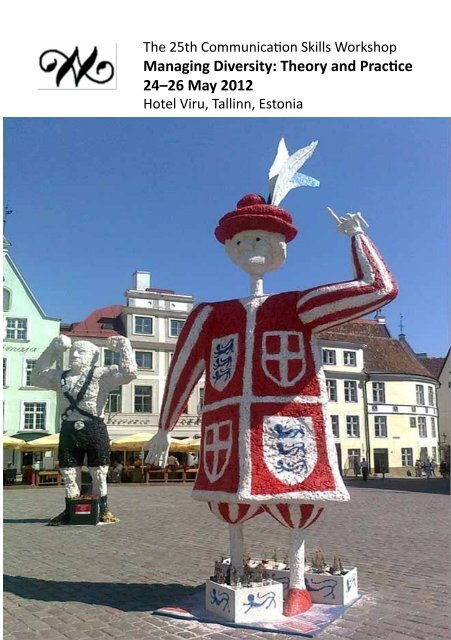
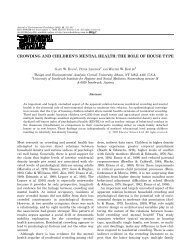
![5 Verben 2 S[1]. 35-44.pdf](https://img.yumpu.com/27096544/1/184x260/5-verben-2-s1-35-44pdf.jpg?quality=85)
